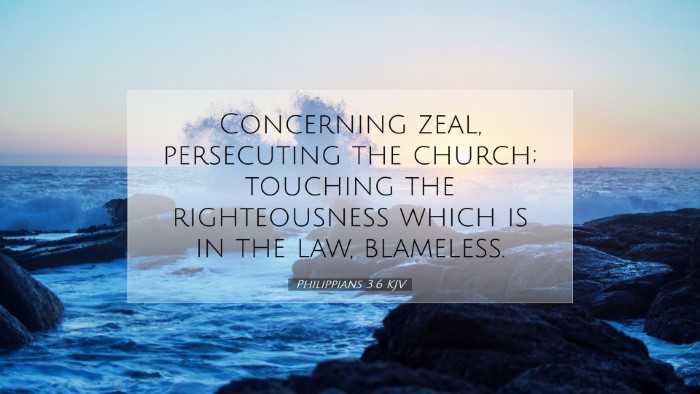Commentary on Philippians 3:6
Philippians 3:6 states: "Concerning zeal, persecuting the church; touching the righteousness which is in the law, blameless."
Contextual Overview
This verse emerges from a larger discourse where the Apostle Paul contrasts the righteousness obtained through the law against that which comes through faith in Christ. Within this context, Paul recounts his previous life and credentials as he argues against the Judaizers and affirms the superiority of a faith-based relationship with Christ.
Analysis of Key Phrases
- Concerning zeal: Paul begins by emphasizing his fervor for Jewish traditions and the law. His zeal was not merely emotional but was deeply rooted in an earnest desire to uphold what he believed to be right.
- Persecuting the church: His zeal manifested in actions that were aggressive towards Christians, whom he viewed as a threat to Judaism. This statement underscores the intensity of his former life where he believed he was serving God through these persecutions.
- Touching the righteousness which is in the law, blameless: Here, Paul asserts his moral integrity; he adhered strictly to the law and was, in the eyes of his contemporaries, a model of righteousness. His claim to blamelessness indicates a profound level of commitment to legalistic observance.
Insights from Matthew Henry
Matthew Henry emphasizes the depth of Paul's former commitment to Judaism. He points out that Paul’s zeal was like that of many who are zealous for what they believe but fall short of the truth. Henry states, "There are diligent people, who may be very sincere, yet very mistaken." This serves as a caution for believers to ensure that their zeal is aligned with the truth of the Gospel and not merely traditionalism.
Insights from Albert Barnes
Barnes elaborates on the implications of zeal in this context. He mentions the dangers inherent in a misguided zeal, noting that Paul’s persecution of the Church was a result of his fervent commitment to the Jewish faith. He observes, "The zeal of Paul was not according to knowledge." Thus, he warns that zeal, if not informed by divine revelation and the guiding principles of grace, can lead one to catastrophic actions, such as those of Paul before his conversion.
Insights from Adam Clarke
Adam Clarke adds a nuanced view of the expression of Paul’s righteousness. He notes that Paul’s adherence to the law was commendable from a human perspective but devoid of the transformative power of grace which he later describes as essential to true righteousness. Clarke argues, "External observance does not equate to internal holiness." Paul’s blamelessness under the law served as a poignant contrast to his later experiences wherein he discovers the true nature of righteousness, which comes through faith in Christ.
Theological Implications
The implications of Philippians 3:6 reach far into discussions of legalism versus grace. Paul’s life serves as a testament to the transformation that occurs when one encounters the risen Christ. From a zealous persecutor, he becomes a fervent proponent of the faith he once opposed. This radical shift emphasizes that no one is beyond the reach of God’s grace, regardless of their past.
Applications for Today's Believers
- Evaluate Your Zeal: Believers should reflect on what drives their passion for God. Is it based on traditions, personal convictions, or a true relationship with Christ?
- Understanding Righteousness: The notion of being “blameless” can lead to self-righteousness. It is vital for believers to understand that righteousness comes only through faith in Christ.
- Acknowledge the Power of Transformation: Paul’s life story is one of immense change. Believers today can have hope that transformation is always possible through encountering Jesus.
Conclusion
Philippians 3:6 offers profound insights into human spirituality, contrasting external adherence to the law with the internal transformation that comes through faith. It warns against the dangers of misguided zeal and calls for a re-evaluation of what true righteousness entails. For pastors, theologians, and scholars, this passage serves as a reminder of the transformative power of the Gospel and the importance of aligning our zeal and actions with the truth of Christ.


